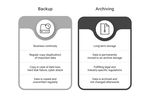Yes, because backup and archiving fulfill different tasks.
- Backup: store and restore data in the short term to ensure business continuity
- Archiving: store data for the long term and protect the integrity of data to meet regulatory or internal requirements.
However, data does not need to be stored in separate silos. Backup and archiving is about the integrity, availability and security of critical data. Instead of storing archive data and backups in separate solutions, both can be stored in one platform.
What does this look like in concrete terms? In a scale-out cluster, for example, you can set up different areas for archiving and backup and connect your backup and archive applications. If more storage space is needed, additional nodes can be easily added. This allows you to use storage capacity efficiently, streamline your infrastructure, and save time and money on maintenance and hardware.


